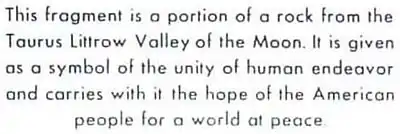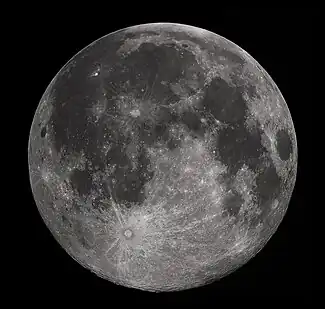
The Honduras lunar sample displays are two commemorative plaques consisting of small fragments of Moon specimen brought back with the Apollo 11 and Apollo 17 lunar missions and given in the 1970s to the people of Honduras by United States President Richard Nixon as goodwill gifts.
Description
Apollo 11
At the request of Nixon, NASA had about 250 presentation plaques made following Apollo 11 in 1969. Each included about four rice-sized particles of Moon dust from the mission totaling about 50 mg.[1][2] The Apollo 11 lunar sample display has an acrylic plastic button containing the Moon dust mounted with the recipient's country or state flag that had been to the Moon and back. All 135 countries received the display, as did the 50 states of the United States and the U.S. provinces and the United Nations.[1]
The plaques were given as gifts by Nixon in 1970.[1]
Apollo 17

The sample Moon rock collected during the Apollo 17 mission was later named lunar basalt 70017, and dubbed the Goodwill rock.[3] Pieces of the rock weighing about 1.14 grams[2] were placed inside a piece of acrylic lucite, and mounted along with a flag from the country that had flown on Apollo 17 it would be distributed to.[3]
In 1973 Nixon had the plaques sent to 135 countries, and to the United States with its territories, as a goodwill gesture.[3]
History
The Honduras Apollo 17 "goodwill Moon rocks" plaque display came into the possession of retired colonel Roberto Agurcia Ugarte; it is unclear how Ugarte obtained it.[4] Ugarte put the plaque up for sale, covering the stars of the Honduras flag to conceal the plaque's origin.[4] Alan Rosen, a Florida fruit distributor, purchased it from Ugarte for what he claims was $50,000 in 1996.[4][5]
In 1998 Rosen attempted to sell the rock and was caught in a sting operation, Operation Lunar Eclipse; U.S. Government agents recovered the rock.[4][6][7][8]
A lawsuit filed against Rosen, United States v. One Lucite Ball Containing Lunar Material (One Moon Rock) and One Ten Inch by Fourteen Inch Wooden Plaque,[9] was settled in 2003. Rosen forfeited the Honduras Apollo 17 lunar sample plaque display, which was presented in 2004 to Honduran President Ricardo Maduro.[4][6] The Honduras Apollo 17 goodwill Moon rock plaque, of as 2012, is on display in Tegucigalpa at Centro Interactivo Chiminike.[3]
According to Robert Pearlman, the whereabouts of the Honduras Apollo 11 goodwill lunar display are unknown.[1]
See also
References
- 1 2 3 4 Pearlman, Robert. "Where today are the Apollo 11 goodwill lunar sample displays?". CollectSPACE. Archived from the original on November 8, 2020. Retrieved November 2, 2012.
- 1 2 "Tales of lunar rocks through the years". The San Diego Union-Tribune. Associated Press. 2012-05-23. Archived from the original on 2023-02-06. Retrieved 2023-02-06.
- 1 2 3 4 Pearlman, Robert. "Where today are the Apollo 17 goodwill lunar sample displays". CollectSPACE. Archived from the original on 2012-10-15. Retrieved 2023-02-06.
- 1 2 3 4 5 Reed, Christina (September 2002). "Geology and society: Moon rocks for sale!". GeoTimes. Archived from the original on 2003-05-18. Retrieved November 2, 2012.
- ↑ Pearlman, Robert (1999–2012). "Full coverage: Honduran moon rock on trial". CollectSPACE. Retrieved November 2, 2012.
- 1 2 Gutheinz, Joseph Richard (November 2004). "In Search of the Goodwill Moon Rocks: A Personal Account". GeoTimes. Retrieved November 2, 2012.
- ↑ Anzovin, p. 67 item #1808
- ↑ 19 U.S.C. 1595a(c)(1)(A)
- ↑ Miami, Florida #01-0116-CIV-JORDAN
Bibliographic information
- Anzovin, Steven (2000). Famous first facts, international edition: a record of first happenings, discoveries, and inventions in world history. New York: H.W. Wilson. ISBN 0824209583.
Further reading
- Kloc, Joe (February 19, 2012). The Case of the Missing Moon Rocks. The Atavist/Amazon Digital Services, Inc. p. 47. ASIN B007BGZNZ8.
